Oceanic Horror
Søren Thilo Funder
Curated by Christopher Sand-Iversen and Rebekka Elisabeth Anker-Møller
25 August - 23 September 2023
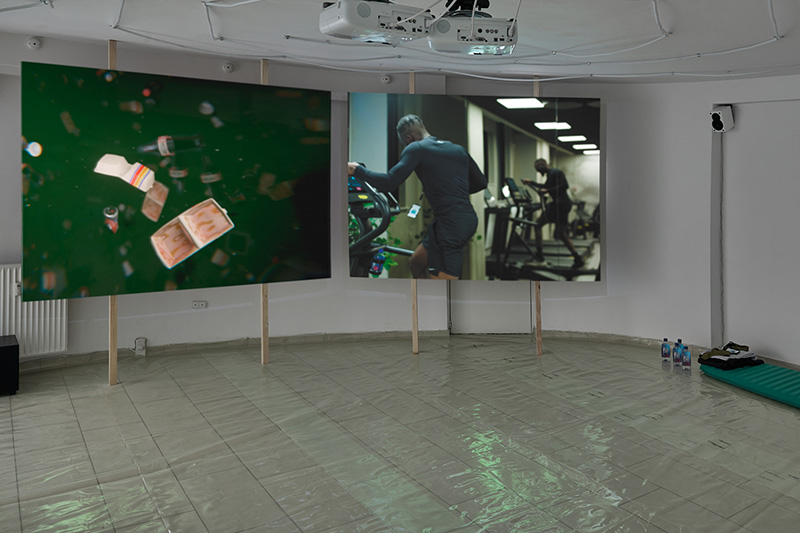
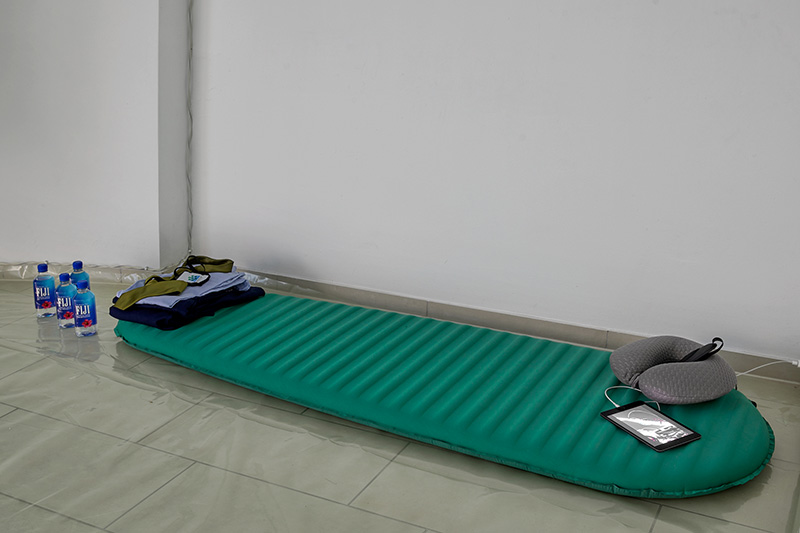
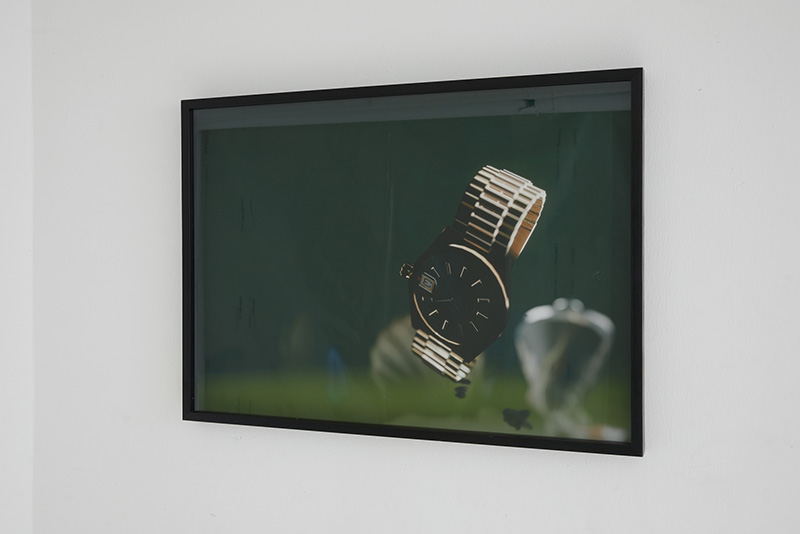
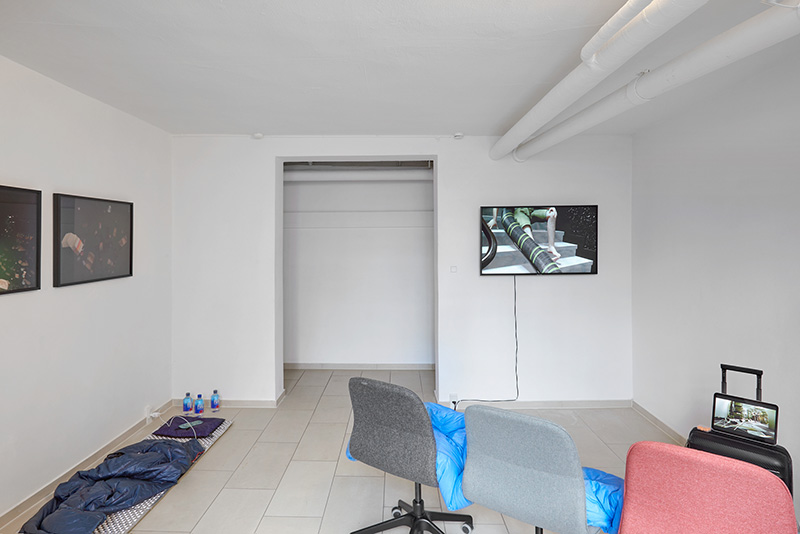
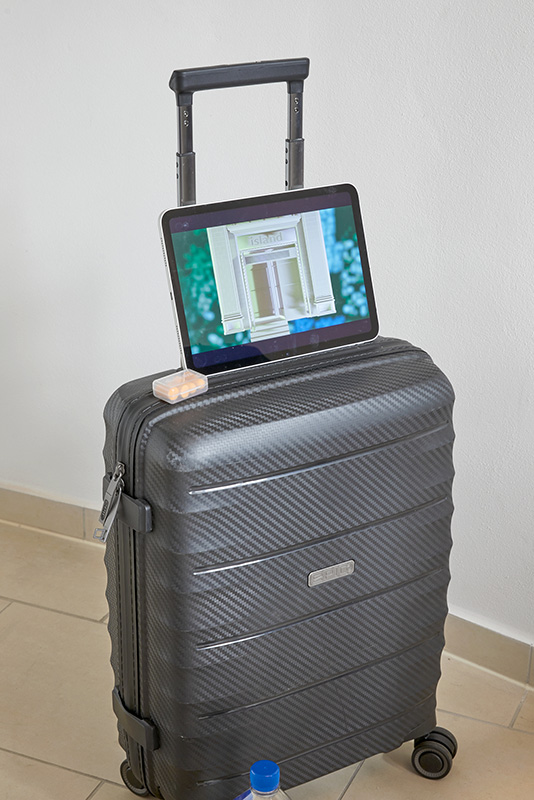
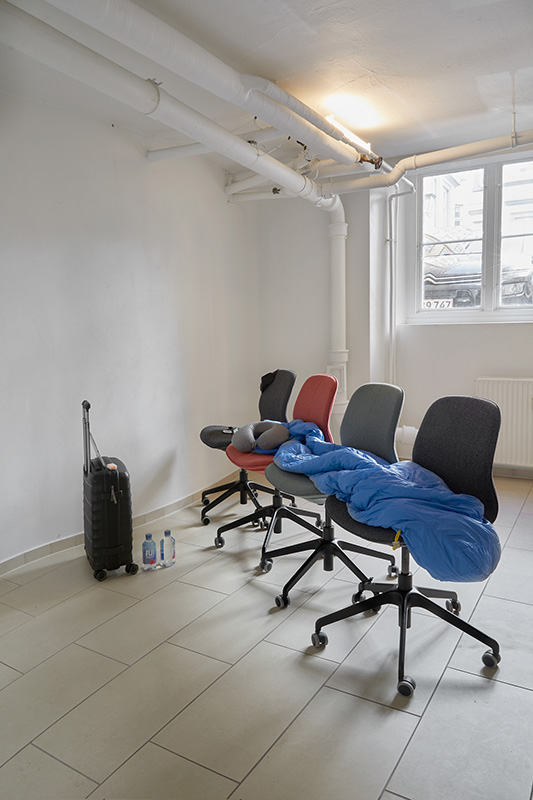
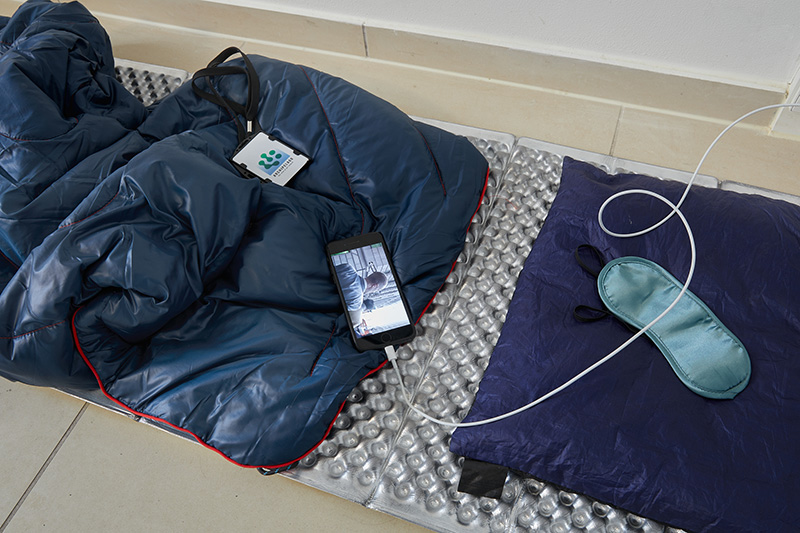
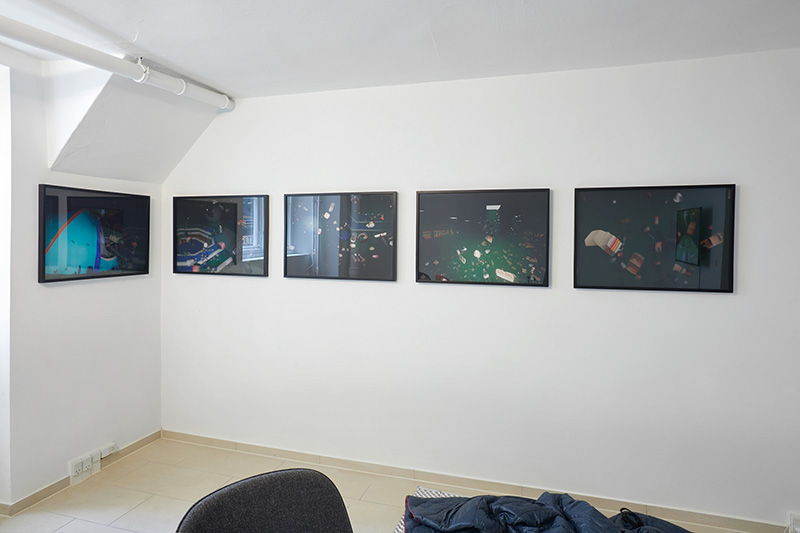
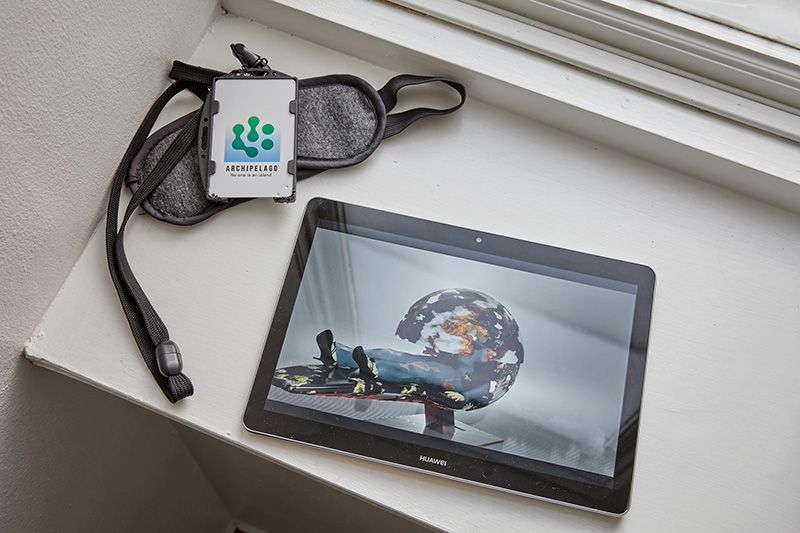
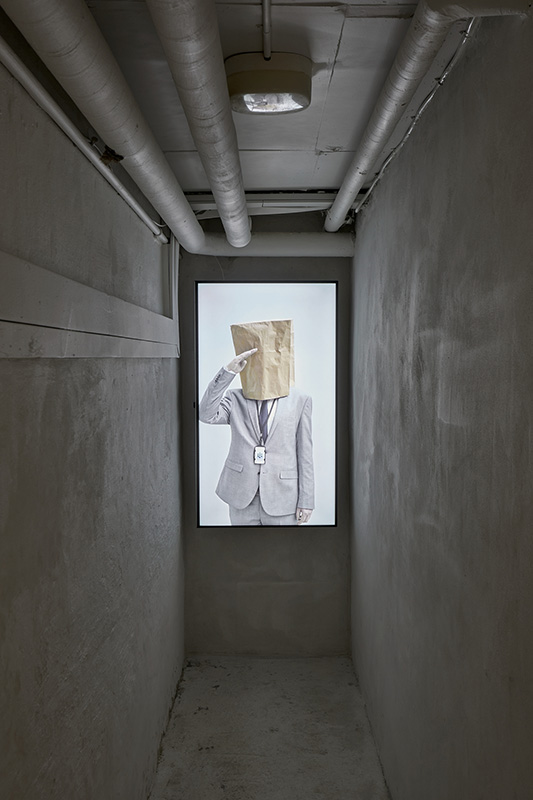
English:
The overall exhibition project takes as its starting point a meditation on the unfathomably trash-ridden condition of the office spaces of the influential trading firm Island ECN, which throughout the 1990s revolutionized financial trading. Island, founded by computer programmer and free information idealist Joshua Levine, had offices on the 10th floor of 50 Broad St in the financial district of New York City. It housed the ultimate in avant-garde high frequency trading; they called themselves ‘Kings of the plumbers’, they were the ones who understood how to bank on the very infrastructure that facilitated the transaction of the stock, rather than the stock itself. It was here that high frequency trading was conceived, and was to leave its distinct mark on the future of economics. A form of trading that outmanoeuvred the human faculties, the speed of every microtransaction weaving ever-new threads in an opaque, unstable neuro-network of hyper-connected currents. A situation that today has not only come to define financial trading but, in the form of AI, is in the process of redefining the way our societies will operate more broadly.
At Portfolio X the core of the installation is shown articulating the key concerns of Funder’s PhD research, exploring the potential of utilizing the genre of horror fiction to create new narratives in a political and time-based artistic practice, and the temporal qualities and entanglements of the horror genre and how these relate in strange ways, not only to our current tempor(e)ality, but also to art practices that use the temporal as material. The research project searches for a certain condition found in horror fiction, which relates to its relentless nowness, a proposed prolonging of this now and its relation to the event and the quasi-event. And finally, how horror fiction wants to do things to the body — not only in a simple reaction mode, but in the very temporality experienced in and by the body.
In the front space the two-channel video piece Archipelago (No one is an island) takes us beyond the world of Island’s physically cabled trading into one in which the human body seems to be wired to near-future technologies in an unfathomable ocean of fluid relations. A world in which “no one is an island,” the world of Archipelago. While people exercise in contemporary optimization of the body, a spoken meditation takes us first on a dreamlike trip to the New York Stock Exchange during the frenzied crash of 1929, then to the Bull and Bear fight in Monterey in 1853. While we are gently transported to the orderly calm of Cathedral Town, Ontario, where the inhabitants of the archipelago of which we all now appear to be a component live in peace and prosperity, the plot circles around a gore-inspired sacrifice. The splash of the omnipresent network becomes the splatter of movie genre tropes – but fragmented across time and multiple viewpoints, the moment eerily fails to be a climax. Perhaps this is what life is like in the archipelago: continually deferred, distracted, escapist and pantomime.
At the far end of the corridor, in Sign Language (Signs taken for wonders), a figure with its head covered in a paper bag gestures in the lost sign language of the trading pit, in which the names of banks are indicated by graphic and inappropriate gestures.
In the back room, we are led back to the trash-ridden Island offices of the late 90s and the snaking cable of early high frequency trading, manifested in an environment of office space sleep pods, carry-on luggage and multiple screens and devices. In Cable ITCH (I don't wanna work at Island no more) the very tangible materiality of the thick fibre optic cable that snaked down the marble staircase, from the 10th floor offices to the 6th floor where Island kept its servers, forms a narrative focal point. This transportation of information down through the building serves as a conduit for investigating the space between physicality and immateriality in the realm of financial tradeíng. In Plumbers (lizard bazooka sea monkey turtle tower terminal) we travel through the unfathomable disorder of the Island office spaces, seen from the point of view of Joshua Levine’s pet iguana. From a small device on a pile of clothes a whistling is heard. In In the Hall of the Mountain King (Whistle) a man presses through the crowd of the financial district in NYC, outpacing the other pedestrians, repeatedly whistling a persuasive tune cracked by the piercing cold. On his shoulder an M is written in chalk.
Finally, a small gold pendant hangs from a gold chain around the neck of the gallerist. The small item of jewellery is cast in the shape of the original entrance to Island ECN in Broad St. Its physicality and tangible value counters the imaginary value of financial economy and the virtuality of all the CGI environments of the installation.
Together with the parallel exhibition Suicide Slide at AGA Works, the exhibition project Oceanic Horror – or How to Survive the Night in the Haunted Mansion of Absolute Capitalism brings together various transrealist narratives revolving around high-frequency trading, financialization and horror fiction, in a speculative encounter with everyday existence and the social relations between the inhabitants of this opaque financial structure.
Bios
Søren Thilo Funder is a visual artist working primarily with video and installation. His works are mash-ups of popular fictions, cultural tropes and socio-political situations, projections and histories. They are narrative constructions that insist on new meaning being formed in the thin membrane separating fictions from realities. Invested in written and unwritten histories, the paradoxes of societal engagement, temporal displacements and a need for new nonlinear narratives, Thilo Funder proposes spaces for awry temporal, political and recollective encounters.
Christopher Sand-Iversen studied Art History at the Courtauld Institute of Art, London, and Visual Culture at the University of Copenhagen. He serves as the director of SixtyEight Art Institute and is the chief editor of RSS Press. He has curated and co-curated numerous exhibitions for SixtyEight since its inception in 2011, as well as editing publications that emerge from the exhibition programmes. He has also translated numerous literary and academic texts; his work has appeared in Asymptote, Shenandoah, Poetry Wales, Precipice, and Poem, and with Passagen Verlag, Forlaget Wunderbuch, Aarhus University, and Cambridge Scholars Press, among others.
Rebekka Elisabeth Anker-Møller is a Danish curator based at SixtyEight Art Institute in Copenhagen. She holds a master's degree in Visual Culture from the University of Copenhagen and an international MA in curating from Aarhus University. Anker-Møller has previously worked at Kunsthal Charlottenborg, VEGA|ARTS and with the curatorial collective South into North, as well as co-managed the exhibition space RØM together with four visual artists (2016-2018). She has also taught curation at Johan Borups Højskole in Copenhagen and at Kunstpionererne in Kunsthal Nord, Aalborg. Recent bigger art projects include Enheduana - Queen of All Powers at Thorvaldsens Museum (2022) and person - in motion at Rønnebæksholm, Copenhagen Contemporary, Kunsthal Nord and Kunsthal Aarhus (2022-2023).
Portfolio X is an art gallery with a mission to showcase the talents of artists from various backgrounds, experiences, and perspectives. They believe in providing a platform for diverse voices to be heard and recognized. Their goal is to create a space that celebrates and attracts attention to upcoming as well as established artists. By representing a wide range of artists, Portfolio X hopes to inspire and engage audiences, foster creativity and dialogue, and contribute to a more inclusive and vibrant artistic community.
SixtyEight is an artistic and curatorial research organisation, which seeks to uncover and develop the exchange between artists and curators and their creative labour. The exhibition Oceanic Horror – or How to Survive the Night in the Haunted Mansion of Absolute Capitalism is part of our current exhibition programme.
The exhibition has received funding from Statens Kunstfond, Beckett-Fonden, Augustinus Fonden, and Knud Højgaards Fond, as well as Grosserer LF Foghts Fond and Rådet for Visuel Kunst, Copenhagen Municipality.
Dansk:
Det overordnede udstillingsprojekt tager udgangspunkt i en meditation over den kaotiske og møgbeskidte tilstand, som kontorlokalerne for det indflydelsesrige handelsfirma Island ECN befandt sig i, alt imens firmaet revolutionerede det finansielle marked gennem 1990'erne. Island, som var grundlagt af computerprogrammør og fortaler for fri information, Joshua Levine, havde kontorer på 10. etage i 50 Broad St i finansdistriktet i New York City. Disse kontorer husede højfrekvenshandlens ultimative avantgarde; “Kings of the plumbers” kaldte de sig. De forstod at satse på selve den infrastruktur, der gjorde det lettere at handle med obligationer, snarere end obligationerne selv. Det var fra disse kontorer, at ideen om højfrekvenshandel blev undfanget, en ide der skulle sætte sit tydelige præg på fremtidens økonomiske strukturer. En form for handel, der udmanøvrerer menneskets evner, hvor hastigheden af hver mikrotransaktion stadig væver nye tråde i et uigennemsigtigt, ustabilt neuro-netværk af hyperforbundne strømme. En situation, der i dag ikke kun definerer finansiel handel, men som via kunstig intelligens er i færd med at omdefinere den måde, vores samfund kommer til at fungere på i fremtiden.
På Portfolio X præsenteres kernen af Funders ph.d.-forskning i en installation, der udforsker potentialet i at benytte horror-genren til at skabe nye fortællinger i en politisk og tidsbaseret kunstnerisk praksis, samt de temporale kvaliteter og forviklinger, som findes i genren. En undersøgelse af, hvordan disse forhold på mærkelige måder relaterer, ikke kun til vores nuværende tempor(e)alitet, men også til en kunstnerisk praksis, der benytter temporalitet som materiale. Forskningsprojektet søger efter en bestemt tilstand, der findes i horror-fiktionen, og som relaterer sig til den genres nådesløse ‘nuhed’, en foreslået forlængelse af dette nu og dette øjebliks forhold til begivenheden og kvasi-begivenheden. Og endelig, hvordan horror-fiktionen altid ønsker at gøre ting ved kroppen - ikke blot i ren reaktion, men i selve den temporalitet, der opleves i og af kroppen.
I det forreste rum fører to-kanals videoværket Archipelago (No one is an island) os ud over Islands fysiske forbundet handel til en verden, hvor den menneskelige krop ser ud til at være forbundet med fremtidsteknologier i et uudgrundeligt hav af flydende relationer. En verden, hvor "ingen er en ø", Archipelagos verden. Mens folk træner i nutidig optimering af kroppen, tager en meditation os først med på en drømmeagtig tur til New York Stock Exchange under det vanvittige krak i 1929, derefter til Bull and Bear-kampen i Monterey i 1853. Mens vi forsigtigt transporteres til den velordnede ro i Cathedral Town, Ontario, hvor indbyggerne i øgruppen, som vi alle nu ser ud til at være en del af, lever i fred og velstand, kredser plottet om en ‘gore’-inspireret ofring. ‘The splash’ fra det allestedsnærværende netværk bliver en direkte reference til splatter-genren – men fragmenteret på tværs af tid gennem flere perspektiver formår øjeblikket på uhyggelig vis ikke at resultere i et klimaks. Måske er det sådan, livet er i øgruppen: konstant udskudt, distraheret, eskapistisk og pantomime-agtigt.
For enden af korridoren, i Sign Language (Signs taken for wonders), gestikulerer en figur med hovedet dækket af en papirpose på det forsvundne tegnsprog, der blev brugt i de såkaldte ‘trading pits’, hvor bankernes navne er angivet med grafiske og upassende fagter.
I baglokalet føres vi tilbage til de affalds fyldte kontorer hos Island i slutningen af 90'erne og det snoede kabel fra den tidlige højfrekvenshandel, manifesteret i et miljø med sovestationer i kontorlokalet, håndbagage og flere skærme og enheder. I Cable ITCH (I don't wanna work at Island no more) danner det tykke fiberoptiske kabels meget håndgribelige materialitet, der snoede sig ned ad marmortrappen fra kontorerne på 10. sal til 6. sal, hvor Island havde sine servere, det narrative fokuspunkt. Denne transport af information ned gennem bygningen tjener som en kanal til at undersøge rummet mellem fysisk håndgribelighed og immaterialitet i den finansielle handel. I Plumbers (lizard bazooka sea monkey turtle tower terminal) rejser vi gennem den uudgrundelige uorden I Islands kontorlokaler, set fra Joshua Levines kæledyr, leguanens synspunkt. Fra en lille enhed på en bunke tøj høres en fløjten. I In the Hall of the Mountain King (Whistle) presser en mand sig gennem mængden i finansdistriktet i NYC, overhaler de andre fodgængere og fløjter gentagne gange en overbevisende melodi som krakelerer i den gennemtrængende kulde. På hans skulder står et M med kridt.
Til sidst hænger et lille guld vedhæng fra en guldkæde om halsen på galleristen. Det lille smykke er støbt i form af den oprindelige indgang til Island ECN i Broad St. Dets fysiske og håndgribelige værdi modvirker den imaginære værdi af den finansielle økonomi og virtualiteten i alle installationens CGI-miljøer.
Sammen med paralleludstillingen Suicide Slide på AGA Works samler udstillingsprojektet Oceanic Horror – or How to Survive the Night in the Haunted Mansion of Absolute Capitalism forskellige transrealistiske fortællinger, der kredser om højfrekvent handel, finansialisering og gyserfiktion, i et spekulativt møde med hverdagens eksistens og de sociale relationer mellem indbyggerne i denne uigennemsigtige finansielle struktur.
Bios
Søren Thilo Funder arbejder primært med video og installation. Hans værker er mash-ups af populære fiktioner, kulturelle troper og socio-politiske situationer, forestillinger og historier. Værkerne er narrative konstruktioner, der insisterer på at danne ny mening i den tynde membran, der adskiller fiktion fra virkeligheden. Optaget af skrevne og uskrevne historier, samfundsdeltagelsens paradoksale natur og et behov for nye nonlineære narrativer, foreslår Thilo Funders værker nye rum for underlige tidsbaserede, politiske og refleksive møder.
Christopher Sand-Iversen studerede kunsthistorie på Courtauld Institute of Art, London, og visuel kultur på Københavns Universitet. Han er leder af SixtyEight Art Institute og chefredaktør for RSS Press. Han har kurateret og co-kurateret adskillige udstillinger for SixtyEight siden starten i 2011, ligesom han har redigeret publikationer, der udspringer af udstillingsprogrammerne. Han har også oversat talrige litterære og akademiske tekster; hans tekstarbejde har figureret i Asymptote, Shenandoah, Poetry Wales, Precipice og Poem, og med blandt andre Passagen Verlag, Forlaget Wunderbuch, Aarhus Universitet og Cambridge Scholars Press.
Rebekka Elisabeth Anker-Møller er en dansk kurator med base hos SixtyEight Art Institute i København. Hun har en kandidat i visuel kultur fra Københavns Universitet og en international MA i kuratering fra Aarhus Universitet. Anker-Møller har tidligere arbejdet på Kunsthal Charlottenborg, VEGA|ARTS og hos kurator-kollektivet South into North samt co-drevet udstillingsstedet RØM sammen med fire billedkunstnere (2016-2018). Hun har derudover undervist i kuratering på Johan Borups Højskole i København og ved Kunstpionererne i Kunsthal Nord, Aalborg. Seneste større kunstprojekter inkluderer Enheduana - Dronning over Verdens Magter på Thorvaldsens Museum (2022) og person - i bevægelse på henholdsvis Rønnebæksholm, Copenhagen Contemporary, Kunsthal Nord og Kunsthal Aarhus (2022-2023).
Portfolio X er et kunstgalleri med en mission om at fremvise talentfulde kunstnere med forskellige baggrunde, erfaringer og perspektiver. De søger at skabe en platform, hvor forskellige stemmer kan blive hørt og anerkendt. Deres vision er at skabe et rum, der fejrer og tiltrækker opmærksomhed hos upcoming såvel som etablerede kunstnere. Ved at repræsentere en bred vifte af kunstnere håber Portfolio X at inspirere og engagere sit publikum ved at fremme kreativitet og dialog og bidrage til et mere inkluderende og levende kunstnerisk fællesskab.
SixtyEight er en kunstnerisk/kuratorisk researchorganisation, der ønsker at afdække, udvikle og fremme udveksling mellem kunstnere og kuratorer og deres kreative arbejdskraft. Udstillingen Oceanic Horror – or How to Survive the Night in the Haunted Mansion of Absolute Capitalism er en del af vores seneste udstillingsprogram.
Udstillingen har modtaget støtte fra Statens Kunstfond, Beckett-Fonden, Augustinus Fonden, og Knud Højgaards Fond, såvel som Grosserer LF Foghts Fond og Rådet for Visuel Kunst, Københavns Kommune.